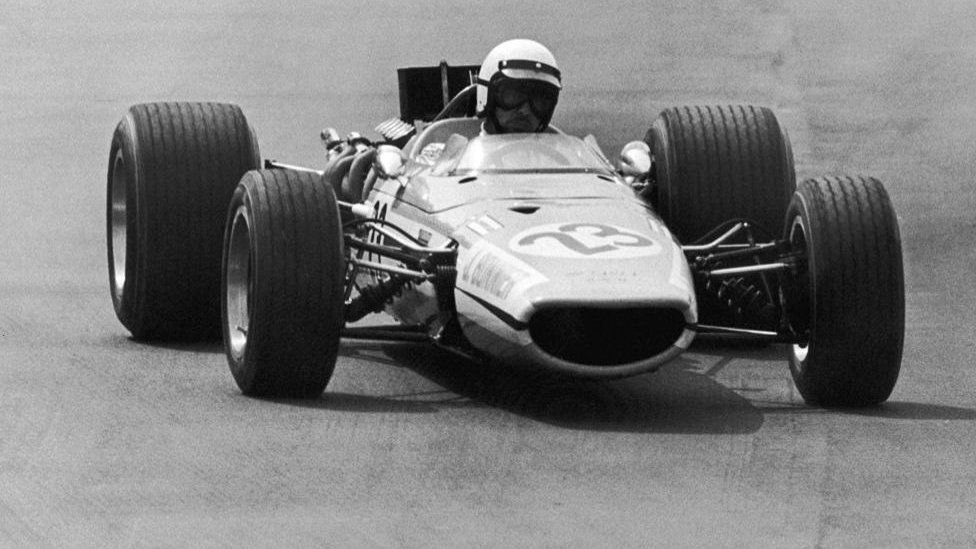The logic in Apple buying McLaren
- Published
- comments

You know what they say: there's no exhaust fumes without combustion.
Well, no-one says that. But you get my drift - the reports that Apple has been considering a $1.5bn (£1.2bn) acquisition (or at least significant investment) in British car maker McLaren have thus far been played down by both parties.
But there are several compelling reasons to take the reports seriously.
For starters, we've known for a while now that Apple is working on car technology. Whether it's planning on developing an actual car is still up in the air, but we know it has been hiring (and firing) people with automotive expertise for the past few years.
We know the company is investing big in external talent, including $1bn in Chinese ride-sharing service Didi Chuxing, the company dominating that market so strongly even Uber decided it didn't have much chance in that country.
McLaren's statement that it was "not in discussion with Apple about any potential investment" was coupled with "as you would expect, the nature of our brand means we regularly have confidential conversations with a wide range of parties, but we keep them confidential".
Today some are seeing that as a nod that at least preliminary, informal discussions had taken place.
And the source, the Financial Times, is not known for being rash in these matters - it was the FT, remember, that had the scoop on Apple's last enormous acquisition: the $3bn deal for Dr Dre's Beats headphone company.
Though the newspaper did caveat its reporting by saying its source wasn't sure if Apple was still interested after a "change of strategy" in its car plans.
Not long after the Beats story went live we were treated to a video, posted to Facebook, of Dr Dre drunkenly declaring himself the "first billionaire in hip hop".
I don't know McLaren Technology Group founder Ron Dennis personally, but I doubt he'll follow Dr Dre's lead on this one.
A veteran's focus
Apple's meticulous approach to secrecy means we'll only know for sure when the company is good and ready. The project is still very much in its infancy - Tesla, Google and others all have cars out there clocking up the miles right now. Then again, Apple has never been particularly worried about being first, and those early-starting rivals should be mindful of the likes of Nokia and Blackberry.
Recent backroom moves surrounding Project Titan - the internal codename for Apple's car efforts - have seen veteran company Bob Mansfield take the helm.
He's a tried, tested and trusted figure at Apple. Formerly the company's top hardware engineer, Mr Mansfield retired a few years ago only to return to oversee development of the Apple Watch. Now, it's reported that a staff of hundreds working on car-related tech reports to him.
Talks with McLaren could be seen as Mr Mansfield's big strategic move, a way to bring in expertise and a culture that would be a fine fit at Apple.
"In the car industry as a whole, almost all companies work on a seven to 10-year cycle for new cars," said Jim Holder from Autocar magazine.
McLaren is quicker than that, he said - something he felt would appeal to Apple.
"McLaren has proven it can work on a three to five-year cycle," he added.
"It can do that because of its racing pedigree. Every two weeks in Formula 1 they turn up with a newer, improved car. Never missing a deadline, and always seeking constant improvement."
What a McLaren acquisition, or investment, wouldn't solve is scale. Setting up a car supply chain and construction line is more complex, expensive and time-consuming than anything Apple has ever done for its devices. McLaren won't really help - its super-luxury cars are put out there in the low thousands each year.
"McLaren is a minnow in terms of the number of cars it makes," added Mr Holder, pointing out that it's the same challenge that has Tesla failing to balance the books.
"[Buying McLaren] doesn't solve that problem at all - but it certainly gives them access to people who can solve that problem."
Toothpaste and terminals
When we look at the potential of Apple buying or investing heavily in McLaren, most are unanimous in thinking Apple is unlikely to get into the business of making or even caring about supercars, and we're not going to see an Apple F1 team. But there's far more to McLaren than that.
For instance, did you know that when you come into land at Heathrow, the gate you find yourself is determined by McLaren's technology? It analyses which planes are landing and when, and optimises gate selection to get people out of the airport more quickly.
In recent years, the company has directed its knowledge of extreme efficiency into other industries through McLaren Applied Technologies, a division that brings racing innovations to more mundane scenarios.
In one quirky example, MAT was brought in to add some pit-lane insight into GlaxoSmithKline's toothpaste production line.
GSK wanted to shorten the amount of time it took to switch which specific type of toothpaste was being put into the tubes - a process which took 39 minutes.
With McLaren's help, they got that down to 15 minutes. It meant an extra six million tubes could be made each year. That and additional manufacturing cost savings meant GSK earned an extra £100m.
When Apple bought Beats, it was mainly about buying a streaming service that provided the backbone to Apple Music.
In a McLaren acquisition, cars may be just one part of an enticing package.
Follow Dave Lee on Twitter @DaveLeeBBC or on Facebook
- Published21 September 2016
- Published16 September 2016
- Published17 August 2016